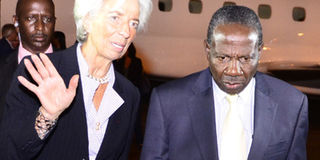Lagarde "impressed" by Uganda’s economic progress

International Monetary Fund Managing Director Christine Lagarde (left) talks to Finance minister Matia Kasaija at Entebbe International Airport after her arrival in Uganda last Wednesday. Ms Lagarde was in the country at the invitation of President Museveni. Photo BY ALEX ESAGALA
Kampala – The International Monetary Fund (IMF) managing director Ms Christine Lagarde is impressed by Uganda’s economic progress since the 1990’s when the fund recommended radicle economic reforms.
Ms Lagarde, who concluded a three-day visit to Uganda on Saturday hailed Uganda on poverty reduction, public investment, inclusive growth, financial inclusion and transparency in the oil sector.
She had come to Uganda, as she said prior to the visit, to understand the economic agenda going forward.
“These achievements have been underwritten by strong macroeconomic policies and a reliance on the private sector as the engine of growth. Looking ahead, I welcome the government’s sense of urgency and emphasis on promoting inclusive growth which is needed to make further progress on poverty reduction and create jobs for the fast-growing population,” she said in a statement.
She noted that with inclusive growth, jobs will be created through increased public investment.
However, there is a word of caution on this point when she says that Uganda can only reap the benefits if it deals with the implementation challenges like delays, poor fund absorption, poor project appraisal, and corruption – especially in the roads sector.
“The government’s focus on overcoming implementation challenges, including through strengthening public investment management, should help ensure that these investments yield the desired outcomes in terms of higher growth and job creation,” she said.
In September last year, the World Bank suspended new lending to the Uganda government on grounds of low absorption among other factors. This tainted Uganda’s reputation especially around multinational lenders.
The Uganda government is holding an optimistic view mainly from oil production that could start in 2020.
With this, the government is estimating annual revenues of $1.5bn (Shs5.4trillion) once production starts. Ms Lagarde on this front noted that she was impressed by the “government’s commitment to transparency and developing a fiscal framework that allows for a sustainable use of the resource.”
She noted that Uganda’s institutions responsible for managing the economy were doing well and placing Uganda on a more sustainable path to growth.
“More generally, I commended the government and the Bank of Uganda for their prudent approach to fiscal and monetary policy. Continued progress on domestic revenue mobilisation will help keep government debt on a sustainable path. Uganda’s inflation targeting framework is serving the country well,” she said.
Her statement on Uganda was rather more positive, but in the meetings there had been cautions by Ms Lagarde on continued borrowing by the government that is increasing debt in the economy. She held talks with President Museveni on Friday.
Mr Museveni described the IMF-Uganda relations as “wonderful” especially on helping with the liberalisation of the economy in the 1990's.
“The IMF made a useful contribution to our economic recovery. They taught us that bleeding is not a good idea,” President Museveni said during a joint press conference with Ms Lagarde at State House on Friday.
He said the thinking of the IMF and Uganda were getting “more aligned.”




